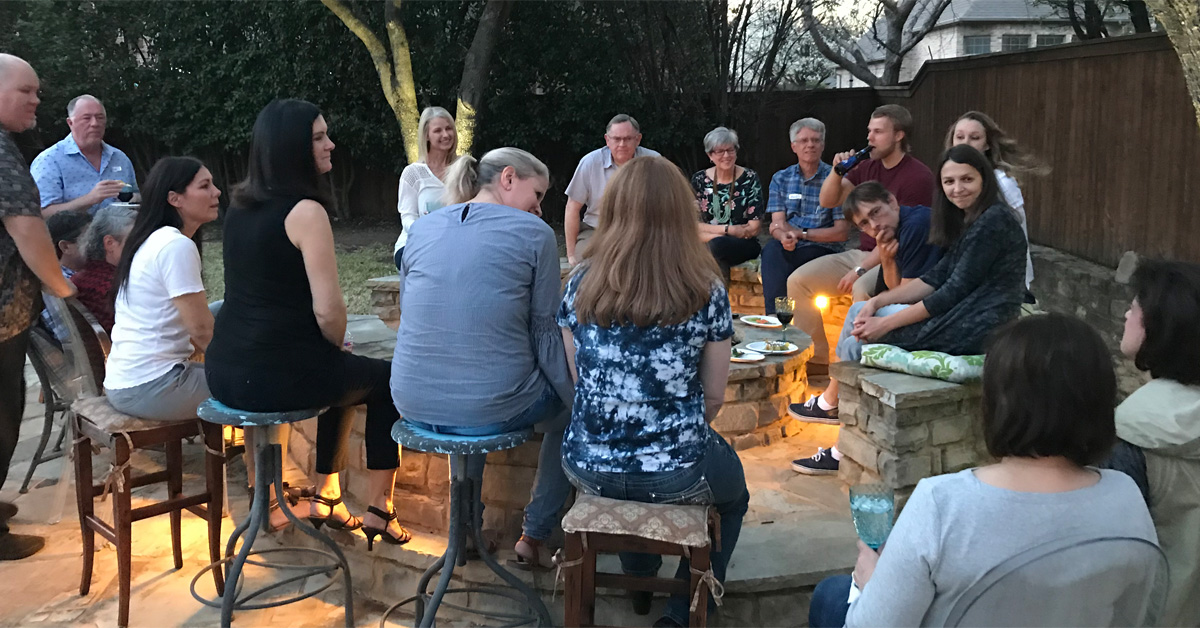It’s time to catch another big bird out of Los Angeles. Tomorrow I’m of to Maryland and Virginia for some conversations about this amazing life we have in Christ. I haven’t done this in awhile and am looking forward to the people I’m going to meet and the life we’ll share together.
Before I go, I thought I’d leave you with an excerpt from the book I’m working on, Finding Church: What If There Really Is Something More. One of my hopes with this book is that once again the idea of the church captures our heart, not as the source of pain and legalism, but as a spotless bride Jesus is assembling from around the world. We’ve been so focused on the church man builds, that many of us miss the one Jesus is building. It is my hope that many of us will come to see that the longing in our heart for real community is the call of God to be part of that bride.
I’m not advocating for an isolated, everyone-is-a-church-to-themselves idea. The church takes her expression in relationships we have with others who are also following him—local friendships as well as international connections as he knits the wider body together. We’ll first see it reflected in conversations where Jesus makes himself known. Some of those conversations will grow into more enduring connections in friendships that become part of the fabric of our lives as we serve, encourage, and grow together. These friendships will lead to others and out of that network of friends and friends of friends, God will have all the resource he needs to invite us to agreement in prayer and collaborative actions to fulfill his purposes around us.
Can it really be that simple? This is perhaps the greatest stumbling block to people seeing the church for what she is. It’s too simple, they think, or too easy. So they put their trust in the vast array of discordant institutions instead of the work of Jesus. As we’ll see connecting is difficult only because it is far easier than we dare to believe. In fact, you probably have those growing connections with people, even in the congregation you attend. I’m only suggesting that your interaction with them expresses more freely the life of the church than sitting in a pew watching the staged activity up front.
So we are going to have to make a distinction in our minds between the church that humanity has attempted to build for two thousand years, and the community of the new creation that Jesus is building. They are not the same, though they can gloriously overlap on occasion. It’s just that our conformity-based structures cannot produce the internal transformation necessary for the church to take shape among us.
Years ago a friend offered me a challenge. “Why don’t we only use the term ‘church” the way Paul talks about her in the Scriptures? Let’s call the church what he calls the church and not be distracted by the institutions that use the term for something less than the reality.” It hasn’t been easy. Common usage trips me up all the time, but I do think the word is worth preserving as a term of endearment so that as we read the Scriptures it will evoke the church Jesus had in mind. I’m going to endeavor to do that here. Rather than use the term for any collection of Christians that meet together in an established system, I’ll use the term church to describe the family of God, which Jesus is putting on display in the world. When I talk about Sunday morning institutions, I’m going to use the word congregations or fellowships. When, because of popular usage, I have no choice but to use the word ‘church’ (such as ‘church split’) for that which is not truly the church, I’ll set it off with quotes.
For the past twenty years I have been privileged to be in a growing conversation with people all over the world who have lost confidence that an institution can provide the environment the church of Jesus Christ needs to flourish in our day. Some of those have already left their congregations in search of a better home. Many others who share the same concerns are still in them, either because they are trying to make the best of a situation for which they see no plausible alternative or because they don’t want to risk separation from family and friends. Many of these are pastors and elders who know better than anyone else the constant struggle between institutional needs and living the priorities of Jesus’ kingdom.
Those of us who’ve already left did so either because we were pushed out for asking the wrong questions or we left because we could no longer continue to serve the demands of an institution that seemed so at odds with the passion growing in our hearts. None of us did so easily, having spent decades serving in local congregations and engaged in multiple efforts to reform them. In the end we left not to abandon our faith, but to explore that faith on a more vibrant journey than our congregations would allow.
I am not writing this book for those who are comfortable in the institutions we’ve inherited in the 21st century, but for those who have the nagging feeling that what we call church today can’t possibly express what Jesus promised. If it doesn’t, how can we recognize and engage the reality of Jesus’ church as she is already growing in the world?
I have so apprecited the vantage point I’ve had over the past twenty years to watch this flock come together. No, it isn’t all that visible for people looking for something splashy, but if you’re looking for the transformation that is going on as people are learning to live in his affection, and seeing the relationships he is connecting all over the world, his work is breathtaking. Of course he wouldn’t do it like we would do it. His ways are far better. I hope this book will stir people’s hearts and open their eyes to a wonderful reality going on in the world.
The book is finally coming together and I hope to be finished with it soon. Right now I’m polishing some of the language, tieing up a few loose ends, and still trying to lose about twelve thousand words so there is less chaff and more wheat! Or so I hope!







Sounds great! I can’t wait to read it!
Sounds great! I can’t wait to read it!
It looks interesting. Your interest in semantics seems to be necessary. Because of the many variations of persons who don’t identify any more with “church”, i’m often finding myself questioning the person about a statement they’ve made to see what meaning they’ve ascribed to a word. For example yesterday at work the boss said that a certain person was quite religious; i felt compelled to ask him “do you mean in a good way or bad”. He understood immediately and said ” Good, definitely good”. Yet, most others in his particular denomination use the term ” religious” in a decidely negative way.
I’m finding your CDs “Power of the Cross” and “Transformations” really helpful, yet only in a justifying sort of way. It’s clear thet they are not the answer in themselves, but provide the theological reassurance that i’m about to step through the right doorway. After that, well you’re quite correct, that our God does indeed reveal himself to us, but just not in the way we might expect. Thank you for your help.
It looks interesting. Your interest in semantics seems to be necessary. Because of the many variations of persons who don’t identify any more with “church”, i’m often finding myself questioning the person about a statement they’ve made to see what meaning they’ve ascribed to a word. For example yesterday at work the boss said that a certain person was quite religious; i felt compelled to ask him “do you mean in a good way or bad”. He understood immediately and said ” Good, definitely good”. Yet, most others in his particular denomination use the term ” religious” in a decidely negative way.
I’m finding your CDs “Power of the Cross” and “Transformations” really helpful, yet only in a justifying sort of way. It’s clear thet they are not the answer in themselves, but provide the theological reassurance that i’m about to step through the right doorway. After that, well you’re quite correct, that our God does indeed reveal himself to us, but just not in the way we might expect. Thank you for your help.
I’ll be looking forward to your book, Wayne.
It seems that for the past few years, within my own group of friends/community we have been learning a lot about what the church is not. Although that has been useful, and probably escential, we have more recently started to re-learn something more about what it is – That’s what I found so useful about Stan Firth’s book ‘The Remarkable Replacement Army’ and if your new book speaks into that space it will be a really useful addition for me/us.
I’ll be looking forward to your book, Wayne.
It seems that for the past few years, within my own group of friends/community we have been learning a lot about what the church is not. Although that has been useful, and probably escential, we have more recently started to re-learn something more about what it is – That’s what I found so useful about Stan Firth’s book ‘The Remarkable Replacement Army’ and if your new book speaks into that space it will be a really useful addition for me/us.